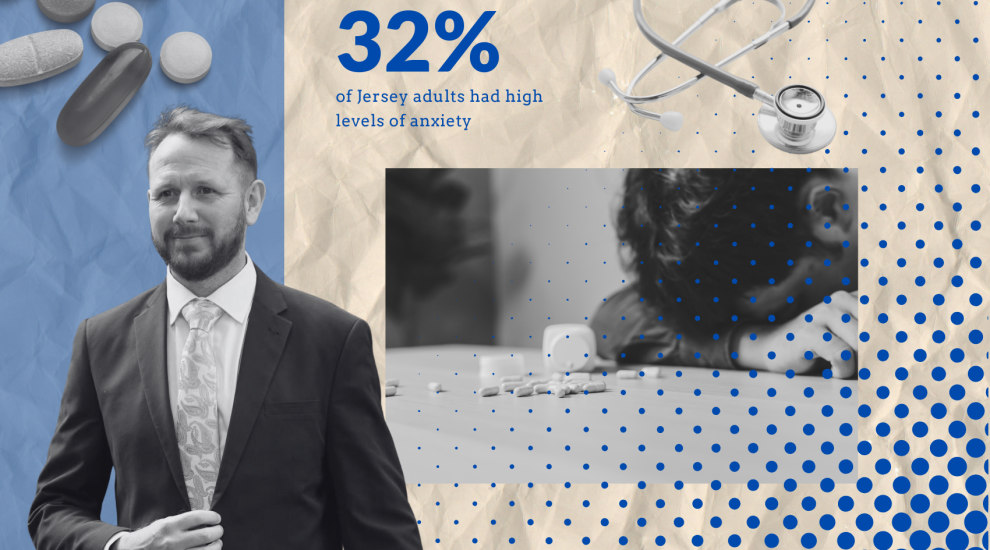


Prescriptions for antidepressants have risen by around 20% compared to pre-pandemic levels, according to new data – with a recent survey also revealing that one-third of islanders reported high levels of anxiety.
A request made by Express under the Freedom of Information Law revealed an 18% rise in antidepressant prescriptions in community pharmacies, and a 23% increase in the Hospital pharmacy between 2019 and 2023.
The data also reveals that over the same period, prescriptions for other mental health medications also surged, particularly in the Hospital pharmacy.
ADHD medications nearly tripled with a 192% increase, while benzodiazepines – often used to treat anxiety, insomnia, and seizures – more than doubled at 121%.
Hospital prescriptions for mood stabilisers rose by 66% and antipsychotics by 42%.
Note: The above details the number of prescriptions for the listed medications dispensed annually by Health department in the Hospital Pharmacy.
Community pharmacies recorded more modest changes, with antipsychotic prescriptions up 24% and benzodiazepines increasing 7%.
Meanwhile, mood stabiliser prescriptions showed a slight decline of 1% in community pharmacies.
Drugs used to treat mental health conditions are often considered to be controlled substances, and therefore can only be prescribed through the Hospital Pharmacy rather than in the community.
The overall surge in prescriptions for mental health drugs coincides with growing levels of anxiety among islanders.
The Jersey Opinions and Lifestyle Survey found 32% of adults reported ‘high’ anxiety in 2024 – an increase from 28% in 2023.
Note: The data is for medicines dispensed in the community and funded by the Health Insurance fund, so excludes Hospital prescribing (see above) and private prescribing.
The findings coincide with a growing conversation about the balance between medication and access to other mental health treatments, such as counselling – and mirror broader concerns in the UK about over-reliance on medication and a lack of investment in alternatives.
Reform Jersey Deputy Tom Coles, who has previously spoken out against the risks posed by unregulated counselling practices, said the figures highlight the need for a closer look at how mental health services are delivered in the island.

Pictured: Deputy Tom Coles said he is keen to explore how "social policy can bring about positive change to the mental health of fellow islanders".
“The prescription and use of mental health medication has dramatically risen over the past few years, and the discussions arising from this are interesting," he said.
“For some, medication is vital, and it can give people back their lives and most importantly, it can pull people out of crisis and away from danger.”
However, he questioned whether medication was being used to compensate for gaps in service provision.
Deputy Coles asked: “Are we using medication in some instances, to fill a deficit in our health care system?
“Are we using medication to fill the void created by our waiting times for other forms of therapies such as counselling?
“Are we utilising an integrative and collaborative care model for mental health and are these comprehensive plans being delivered in a timely manner?”

Pictured: Mental health prescriptions have risen sharply since 2019, with ADHD medications nearly tripling at the hospital pharmacy.
The politician added that increased awareness around mental health may also explain the rise in prescriptions.
“I think it is fair to say that, in recent years, the stigma around mental health is reducing," he noted.
"People are starting to broaden their understanding of the complexities of mental health, and I think this has translated to people feeling more confident in seeking help.
"With more people seeking help, waiting times in our mental health services will increase unless the government is prepared to increase its resources,” he warned.
The increase in prescriptions comes amid changes in how mental health support from the government is delivered.
Changes in how mental health support is delivered may also play a role.
In 2023, Jersey Talking Therapies now carried out 54% of appointments online, compared to just 3% in 2020.
While online therapy has made the process more convenient for many, others feel it lacks the personal connection needed for effective treatment.
Note: 2024 is a partial year, and only includes appointments from January to October 2024.
Patients have also raised concerns about the 20-week cap on free therapy sessions provided through the service.
One service user told Express: "I've struggled with my mental health for most of my life, so it's not something that's just going to go away after six months of therapy."
The rise in prescriptions in Jersey aligns with broader trends in the UK, where antidepressant prescriptions have nearly doubled over the last decade.

Picutred: "I've struggled with my mental health for most of my life, so it's not something that's just going to go away after six months of therapy."
In 2022, medical experts and politicians called for a reduction in antidepressant use in an open letter to the UK government, pointing to concerns about overprescribing and reliance on medication for issues that could be addressed through alternative approaches.
Andrew Tresidder, a Somerset GP, spoke to The Guardian about the risks associated with this trend.

Picutred: An open letter to UK government in 2022 from experts and politicians said that rising use ‘is a clear example of over-medicalisation’.
He said: “The de-stigmatisation of mental illness over the last 20 years is welcome, but there’s been a worrying growth in the medicalisation of normal distress.
'As prescribers, we need to act carefully, using evidence-based approaches to avoid overprescribing and the risks of dependence.”
Express was interested in the percentage of islanders taking mental health or neurodiversity-related medications and how this had changed over the past five years, so a request was submitted to the FOI team earlier this year.
However, the government responded that such data was not available because prescription records do not track the conditions medications are used to treat or the number of individuals receiving them.
To obtain relevant information, a follow-up FOI request was submitted, asking for the total number of prescriptions issued for specific drugs commonly used to treat mental health conditions.
This included antidepressants (like sertraline and fluoxetine), antipsychotics (such as risperidone and olanzapine), mood stabilisers (including lithium and lamotrigine), benzodiazepines, and ADHD medications.
A full list of the specific medications can be viewed HERE.
The government provided data on the number of prescriptions for each drug dispensed in community pharmacies between 2019 and 2023.
Anyone affected by any of the issues raised in this article can seek help from the following services:
Focus on Mental Illness: telephone 07797 710900 or email info@focusmi.org
The Listening Lounge: call 01534 866793, or access the drop-in service on Charles Street.
MIND Jersey: call 07829 933929, or access the drop-in service on Seale Street (Monday-Friday from 09:00-16:00)
The Samaritans: call 01534 116123
Adult Mental Health Crisis Line (open 24/7 for emergencies): call 01534 445290
Liberate: seek help via its online application form
FOCUS: Calls for “stricter oversight” of private therapy practices
FOCUS: 20 sessions of therapy...and then...?
INSIGHT: Jersey's online therapy shift... greater access or less supportive?
Comments
Comments on this story express the views of the commentator only, not Bailiwick Publishing. We are unable to guarantee the accuracy of any of those comments.